This is a guest post by Raziq
Followers of the Ahmadiyya movement (known as Ahmadis) are often victims of religious bigotry. They have long been popular targets of religious extremists and have suffered a great deal, especially in Pakistan where they have been continuously persecuted. Like most commentators on this site I utterly deplore such actions and I defend the right of Ahmadis to freedom of religion.
I personally spent a number of years studying Ahmadi literature, meeting their leaders and discussing their beliefs. In this article I intend to explain their beliefs, their attitudes towards other faiths and their political views.
The Founder
Ahmaddiya is a religious movement established in 1889 by Mirza Ghulam Ahmad. Ghulam Ahmad was born on 1839, in Qadian, Punjab, India. In the early part of his life, whilst working as a clerk in Sialkot (present day Pakistan), he came into contact with Christian missionaries. As time passed, he began to engage with the missionaries and started challenging them in public debates. This gained Ghulam Ahmad praise from India’s Muslim Scholars and some hailed him as a protector of the Islamic faith against the onslaught of Christian missionaries. However, all this started to change when he began claiming that he was a recipient of divine revelation.
His Claims
In 1889 Ghulam Ahmad claimed to have received a message from God asking him to create a new movement. After receiving pledges of initiation from forty of his followers, he founded the Ahmadiyya movement.
Shortly after this, he claimed that he was the Muslim reformer (Mujadid) of the 20th century. His next claim was that he was the Mahdi and also the second coming of Jesus Christ. As time went by he made various other claims. These included: the discovery of the tomb of Jesus in Kashmir, claiming that the founder of the Sikh faith Guru Nanak was a Muslim and also that he was the likeness of the Hindu Lord Krishna. All these claims led to a barrage of criticism from Muslim, Christian and Hindu scholars, with many declaring him to be a deceiver, apostate and government agent. The main point of contention between Ahmadis and orthodox Muslims was Ghulam Ahmad’s claim to prophethood. The vast majority of Muslims believe the prophet Mohammed to be the last prophet of God, whereas Ghulam Ahmad claimed he was also a prophet of God. Due to this issue some hard-line scholars started calling for the death of Ghulam Ahmad and his followers.
The Split
Ghulam Ahmad died in 1908 but his movement continued under its first successor (Caliph) Hakim Noorideen. After Noorideen’s death in 1914 problems arose concerning the selection of the next leader. This led to the movement splitting into two groups. The splinter group was led by Maulana Muhammad Ali, a long-time companion of Ghulam Ahmad. He believed the election process was unfair and that Mirza Bashirudeen Ahmad (Ghulam Ahmad’s son) had already been secretly chosen as the next leader. Maulana Muhammad Ali broke away from the main party and moved to Lahore to set up his own Ahmadi movement. This movement is today known as the Lahore Ahmadiyyah movement with the main party becoming known as the Qadian Ahmadiyyah movement.
The Lahore Ahmadiyyah movement has very similar beliefs to the Qadian Ahmadiyyah movement. The main difference being that the Lahore movement does not believe Ghulam Ahmad actually claimed to be a prophet of God. They claim that Ghulam Ahmad’s only used the word ‘prophet’ in a metaphorical sense. They therefore claim to be orthodox Muslims and only believe Ghulam Ahmad to be a Muslim reformer.
Persecution
After the partition in 1947 many Ahmadis moved to Pakistan and settled in the city of Rabwah. This also became their new headquarters after the original headquarters of Qadian went to India. The first foreign minister of Pakistan Sir Chaudhry Muhammad Zafrullah Khan was an Ahmadi. Riots, usually led by extremist fanatics intermittingly broke out against Ahmadis. One famous instigator of such riots was the Islamist leader Maulana Mawdudi. In 1973Zulfiqar Ali Bhutto, under pressure from religious figures, had the Pakistani constitution amended, declaring Ahmadis as non-Muslims. In 1984 the Head of the Ahmaddiyya movement ‘Mirza Tahir Ahmad’ (Ghulam Ahmad’s grandson) fled from Pakistan and settled in the UK. This was because of the increasing persecution his movement was facing in under the military dictatorship of Zia ul Haq.
Propagation
In London the Ahmadiyya movement has been very actice in propagating its faith. It works as a missionary movement and has its own satellite TV channelMTA. However, many people have criticised the way it operates and have accused it of using underhand tactics to gain recruits. For example, many ex-members have claimed they were duped into thinking they were converting to Islam and not told anything about Ahmaddiya beliefs or its founder; see the article Escape from Rabwah: http://www.alhafeez.org/rashid/escape.htm. Other prominent ex-members who have come out to criticise the movement and its recruitment techniques, include Sheikh Raheel Ahmad and Shahid Kamal.
Views on Israel
Despite claiming to be moderate Ahmadis have been criticised for holding extremist views, especially against the state of Israel. For example, during the Gulf War the Head of the Ahmadiyya Movement, Mirza Tahir Ahmad, issued a book titled ‘The Gulf Crisis & The New World Order’. In this book he blamed Israel for the Gulf War and just about every problem in the Middle-East. He even questioned the validity of Israel’s existence as a country:
“Take for example, the establishment of Israel in the Muslim region. Although America was also involved in a major way, yet this mischief was initiated by British. It is the product of British minds” (The Gulf Crisis & The New World Order, Islam international Publications, UK 1993, Pg 178)
“Israel was created in the name of the United Nations and the greatest role played in its establishment was by the US. One matter that amazes me is why was no question raised as to whether the U.N. has a right to create a new country in the world? (Pg 178)
“There is no basis for the creation of that country… In fact the creation of Israel is not an act of enmity against the Arabs but against Islam” (Pg 179)
“Do you think the sounds emanating from the minarets of Mecca and Medina are those of Allah and His Prophet? The truth is that these minarets simply project the loudspeakers which are connected to the microphones located in Washington where Israel is the speaker using these microphones” (Pg 192)
Amazingly, Tahir Ahmad also believed that the document ‘Protocols of the Elders of Zion’ (a well known forgery) was a Jewish scheme to control the world:
“This was a scheme of the top leaders of Israel, who believe in Zionism, as to how they shall dominate the world, what mode of action shall be adopted for this purpose, what will be the work principles and objectives, what means will be adopted etc” (The Gulf Crisis & The New World Order, Islam International Publications, UK 1993, Pg 199)
The book is full of the same anti-Israel conspiracy theories peddled by Islamist groups such as Hizb ut-Tahrir. In the same book Mirza Tahir Ahmad also praises the Iran:
“I have openly admitted number of times that their religious differences notwithstanding, the Iranian nation does not behave hypocritically when it comes to Islam: they are the true lovers of Islam…Iran’s services to Islam are second to none” (The Gulf Crisis & The New World Order, Islam international Publications, UK 1993, Pg 194-195)
At times it was hard to believe that this book had not been written by Islamists.
On Jihad
The second leader of the Ahmaddiyah Movement, Mirza Bashirudeen Ahmad, explained the Ahmadiyyah view on Jihad as follows:
“The fifth big objection raised against us is that we deny the institution of Jihad. I have always wondered how such a false charge could have been made against us, for to say that we deny Jihad is a lie. Without Jihad, according to us, belief cannot be made perfect….We are not against Jihad. We are only against the tendency to label any kind of aggrandizement as Jihad”. (Invitation to Ahmaddiyat, by Mirza Bashirudeen Ahmad, Islam International publications, 1997, pg 52)
“In short, the Jihad sanctioned by Islam is to make war against a people who prevent others from accepting Islam, or who wish to force people to deny Islam. It can be made against a people who kill others because of Islam”. (Invitation to Ahmadiyyat, by Mirza Bashirudeen Ahmad, Islam International Publications, 1997, pg 56)
It is also worth noting that some Hindu groups blame Ahmadis for the murder ofPandit Lekh Ram, an opponent of Mirza Ghulam Ahmad.
Conversions
During my time studying with the movement I got to see a very problematic side to it. In the beginning the Ahmadis I met were very welcoming and very courteous. I was treated very respectfully and regularly invited to their houses, Mosques and gatherings. I was also told that after I finished studying Ahmadi literature I would definitely convert to Ahmadism and this seemed to be their main goal. However, when this didn’t happen, the members and leaders I was in touch with suddenly turned very cold. They even started getting aggressive and began telling me that I was destined to go to hell for rejecting the Ahmadi truths. This was coming not just from regular members but also from their leaders and Imams. I was also regularly told that only their version of Islam was acceptable to Western countries and they were working very hard to keep it that way.
It seemed that their sole objective was to convert me and when this failed they didn’t want to talk to me again. They behaved in a very cult like fashion and I was later to discover that I wasn’t the only one to receive this treatment from them.
Conclusion
The Ahmaddiyya movement continues to suffer from persecution and discrimination. This is clearly wrong and we must all speak out against this injustice. However, the Ahmadi movement itself is not as moderate as it claims to be. Despite its PR image, it also holds extremist and bigoted views. As well as supporting the Ahmadis right to freedom of religion their problematic views also need to be exposed and challenged.


